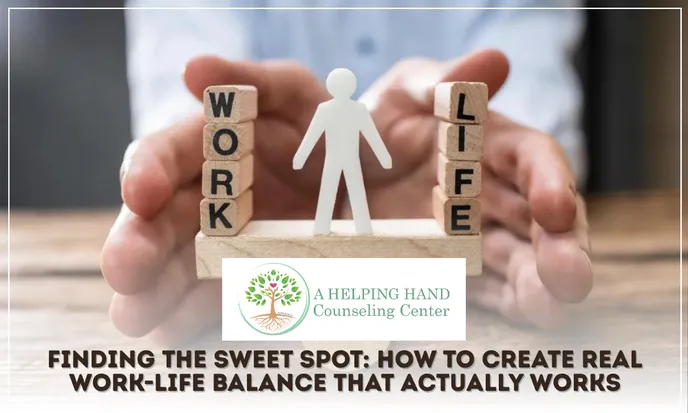
Finding the Sweet Spot: How to Create Real Work-Life Balance That Actually Works
But here’s the truth: balance isn’t a myth—it’s a mindset.
At A Helping Hand Counseling Center, we help individuals every day who are navigating this very struggle. Whether you’re balancing a demanding career, parenting responsibilities, personal growth, or all of the above, finding your “sweet spot” is possible—and essential for your long-term mental health.
Let’s explore what balance really means and how you can build a sustainable version of it that supports your personal and professional life.
1. Redefine What Balance Means to You
Work-life balance isn’t one-size-fits-all. It’s not about splitting your day evenly between work and personal time. It’s about aligning your time with your values.
You might have a season of intense work—like a new business launch or major deadline. That’s okay. Balance means adjusting and compensating. Take a few days off afterward, disconnect, and recharge. Your version of balance will evolve with your career, your relationships, and your stage of life.
Tip:
- Make a list of your non-negotiables (family dinners, therapy sessions, workouts, or sleep).
- Then build your schedule around those core pillars. That’s where balance begins.
Related Reading: Individual Therapy Services
2. Set Boundaries—and Stick to Them
One of the biggest threats to balance is the lack of clear boundaries, especially with remote or hybrid work. If you’re checking emails during dinner or working late every night, it’s time to reevaluate.
Boundaries protect your mental space, help prevent burnout, and create predictability in your daily life.
Actionable Step:
- Set defined work hours—and actually stop when those hours are done.
- Use “Do Not Disturb” settings on your phone or apps after a certain time.
- If needed, communicate your availability clearly to coworkers or clients.
Struggling with boundaries? Explore Family Counseling to better understand and establish them together.
3. Use Your Time Off
Vacations, mental health days, and long weekends aren’t indulgences—they’re tools. Still, many professionals skip time off because they feel guilty or worry they’ll fall behind.
Here’s what’s real: taking breaks increases productivity, creativity, and focus. It also gives your body and mind a chance to recover, which is key for emotional resilience.
Reminder:
- You don’t have to wait for burnout to justify rest.
- Use your PTO. Schedule mini getaways or staycations to disconnect intentionally.
4. Prioritize Tasks Ruthlessly
Not everything needs to be done right now. And it doesn’t all need to be done by you.
Many of us confuse “busy” with “productive.” True productivity comes from knowing what to focus on, when to delegate, and when to say no.
Try This:
- Use the Eisenhower Matrix to sort tasks by urgent vs. important.
- Delegate low-priority tasks when possible.
- Batch emails, meetings, or errands to save time and mental energy.
5. Embrace Flexibility
Gone are the days of rigid work hours being the only acceptable structure. Flexibility doesn’t mean less work—it means better work. Some people are more focused in the early morning; others hit their stride in the afternoon.
When workplaces support flexible schedules, they create room for employees to thrive in a way that fits their natural rhythm.
Suggestion:
- Ask your employer about flexible hours or remote work options.
- Consider restructuring your day to align with your energy levels.
- For parents or caregivers, flexibility is often the key to sanity.
We support flexible therapy options too. Explore Telehealth Counseling for sessions that fit your lifestyle.
6. Invest in Self-Care
You cannot show up for your job, family, or community if you’re running on empty. Self-care isn’t selfish—it’s survival.
Self-care can look like journaling, walking, taking a tech break, therapy, sleep, or saying “no” when your plate is full.
Start Small:
- Try 10 minutes of deep breathing or movement in the morning.
- Keep one hour tech-free before bed.
- Reconnect with a hobby or activity that brings you joy.
Learn how Group Sessions can support your self-care journey and provide a sense of community.
7. Lead by Example
If you’re in a leadership or management role, your habits set the tone. If you email at midnight or never take time off, your team will assume that’s the expectation—even if you say otherwise.
Healthy teams are built by healthy leaders.
Leadership Tip:
- Normalize taking breaks and respecting boundaries.
- Encourage your team to disconnect after hours.
- Share when you’re taking a mental health day—and celebrate others who do the same.
Real Balance Isn’t Perfect—It’s Personal
Let’s be clear: balance does not mean perfect harmony every day. Some days will lean heavier into work, others into family, rest, or unexpected life stuff.
It’s not about achieving a flawless schedule—it’s about creating a sustainable one.
When you begin aligning your time, energy, and focus with what matters most, your life starts to feel more manageable—and meaningful. You experience less guilt, less burnout, and more satisfaction across all areas of your life.
Signs You Might Be Out of Balance
Still not sure if you’ve tipped too far one way or the other? Here are some common signs of imbalance:
- Constant fatigue or emotional exhaustion
- Feeling resentful about work or home demands
- Frequent headaches, insomnia, or digestive issues
- Short temper or emotional outbursts
- Disconnection from friends, family, or hobbies
- Trouble staying focused or motivated
If you’re experiencing any of the above, it may be time to reassess your boundaries, responsibilities, and priorities—and to get support if you need it.
How Counseling Can Help You Find Your Sweet Spot
You don’t have to figure it all out alone. Therapy can help you:
- Identify your personal and professional values
- Establish realistic goals and daily routines
- Improve communication with your employer, partner, or family
- Process stress, guilt, or burnout
- Rebuild your emotional energy and confidence
At A Helping Hand Counseling Center, we’ve helped individuals just like you reclaim their peace, structure their time, and reconnect with what matters most.
Whether you’re a full-time parent, busy professional, student, or caregiver, we’ll help you find balance that actually works for you.
Ready to Reclaim Balance?
If work-life balance feels out of reach, don’t wait for a breaking point. You deserve to feel in control, connected, and well.
Call A Helping Hand Counseling Center today at (407) 450-5985 or request an appointment to get started with one of our licensed counselors. Conveniently located in St Cloud, FL.
Let’s find your sweet spot—together.
A Helping Hand Counseling Center
- 303 Commerce Center Drive St. Cloud, FL 34769
- teamcare@ahhcounseling.com
- (407) 450-5985
- www.ahhcounseling.com
Subscribe to Our Newsletter
Posts Category
Most Popular Posts

Family Counseling: Building Stronger Bonds & Healthier Homes
In a world where daily life can feel overwhelming, the importance of mental health counseling has never been more apparent. Whether you’re facing stress, anxiety,

Rediscover Each Other: How Relationship Counseling Can Rebuild Connection and Trust
Struggling with disconnection, conflict, or emotional distance? Learn how relationship counseling can help couples rebuild trust, communicate better, and grow together. Every relationship tells a

Healing Together: How ART, Marriage & Family Counseling Transform Lives in St. Cloud
Discover how Accelerated Resolution Therapy and marriage & family counseling at A Helping Hand Counseling Center in St. Cloud, FL can help you heal trauma,
Subscribe to Our Newsletter





